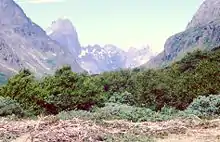Qinngua Valley
Qinngua Valley, also called Qinnquadalen, Kanginsap Qinngua and Paradisdalen, in Greenland is about 15 kilometres (9.3 mi) from the nearest settlement of Tasiusaq, Kujalleq. The valley has the only natural forest in Greenland and is about 15 kilometres (9.3 mi) long, running roughly north to south and terminating at Tasersuag Lake. The lake drains into Tasermiut Fjord. Mountains rise as much as 1,500 metres (4,900 ft) on either side of the narrow valley.[1]
| Qinngua Valley | |
|---|---|
| Location | |
| Country | Greenland |
| Physical characteristics | |
| Source | |
| • elevation | 550 m (1,800 ft) |
| Mouth | |
• location | Tasersuaq Lake |
• elevation | 2 m (6.6 ft) |
| Length | 15 km (9.3 mi) |

_Greenland._Salmon-trout_fishing_in_the_Qinngua_valley_(12168736363).jpg.webp)

The valley is situated about 50 kilometres (31 mi) from the sea and protected from the cold winds coming off the interior glaciers of Greenland. In total, over 300 species of plants grow in the valley. The forest in Qinngua valley is a thicket consisting mainly of downy birch (Betula pubescens) and gray-leaf willow (Salix glauca), growing up to 7–8 metres (23–26 ft) tall. Growing sometimes to tree height is the Greenland mountain ash (Sorbus groenlandica), which is usually a shrub.[1] Green alder (Alnus crispa) is also found in the valley.[2]
It is possible that other forests of this type once existed in Greenland but were cleared by early settlers for firewood or building material. The valley was declared a protected natural area in 1930.[2]
Although nearly all of ice-free Greenland has an Arctic tundra climate (ET in the Köppen climate classification), Qinngua valley may have a sub-arctic Dfc climate.[1]
References
- "Qinngua Valley". Wondermondo. Retrieved 2015-01-20.
- "The Forest Plantations in the Greenlandic Arboretum". Retrieved 2019-07-05.